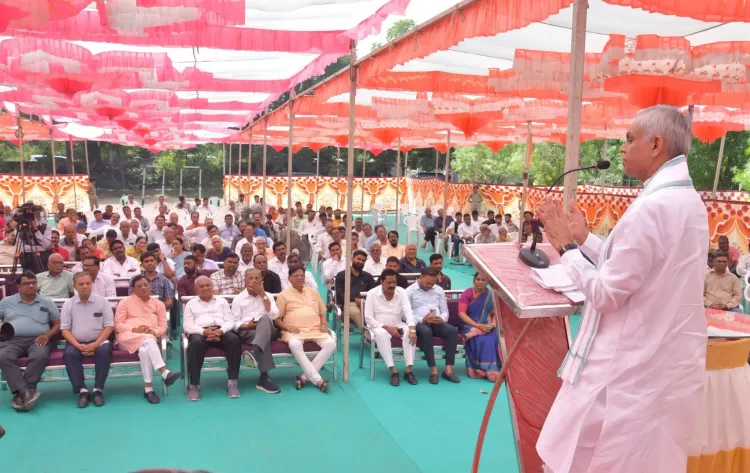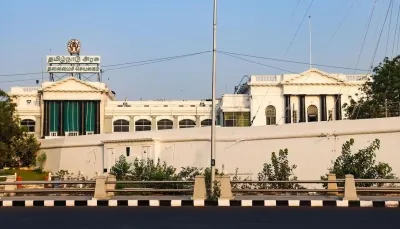Can Desi Cow-Based Natural Farming Save Our Environment and Health?

Synopsis
Key Takeaways
- Indigenous cows are essential for environmental protection.
- Natural farming utilizes cow dung and urine for soil health.
- Desi cow milk is linked to enhanced cognitive abilities in children.
- Government initiatives aim to support cow breeders.
- Natural farming practices can maintain crop yields while enriching soil.
Ahmedabad, Oct 19 (NationPress) Gujarat Governor Acharya Devvrat highlighted the importance of the indigenous cow in safeguarding the environment and enhancing public health during a special event centered on Gau Poojan, Gau Sanvardhan, and desi cow-based natural farming, held at Nageshwar Kalyan Shakti Dham in Hirapur village, Ahmedabad district.
Reflecting on the legacy of cow advocate and warrior Devrishi Kallaji Rathod from Rajasthan, the Governor noted that Rathod’s commitment to cow protection continues to inspire future generations.
In memory of Rathod, the Nageshwar Kalyan Shakti Dham Trust was founded in 2005, serving as a hub for cow conservation, as well as religious, spiritual, and social upliftment.
During his address, Governor Devvrat referred to the indigenous cow as the most beneficial animal on earth, often honored in ancient scriptures as the “mother of the world”.
He referenced studies from Australia and New Zealand that categorize Indian desi cow milk as A2 and foreign cow milk as A1, asserting that A2 milk is “amrit-tulya” (like nectar) and loaded with vital health benefits.
Moreover, he stated that consuming desi cow milk can enhance cognitive abilities in children.
In addition to milk, cow dung and urine are rich in various beneficial microorganisms essential for natural farming techniques.
The Governor also brought attention to the serious decline in cow populations, noting that cows once outnumbered humans in India by a ratio of ten to one.
“Currently, non-milking cows often create financial strain for farmers. To assist cow breeders, Prime Minister Narendra Modi has promoted the scientific application of technology to increase the likelihood of calf births from cows,” he stated.
Addressing the dangers of chemical fertilizers, Governor Devvrat advocated for desi cow-based natural farming, stressing its advantages for soil fertility, environmental preservation, and human health.
Research conducted at four agricultural universities in Gujarat indicates that natural farming sustains crop yields while enhancing soil nutrients and conserving water and the environment.
The event also featured remarks from Bharat Patel, Provincial Sanghachalak of the Rashtriya Swayamsevak Sangh, who urged the youth to embrace cow-centric lifestyles and called for the establishment of cow hostels and research initiatives.
Mahalandaleshwar Akhileshdasji Maharaj acknowledged ongoing cow conservation efforts, emphasizing the spiritual significance of Gau Poojan in Indian texts, and encouraged citizens to actively engage in cow service initiatives.









